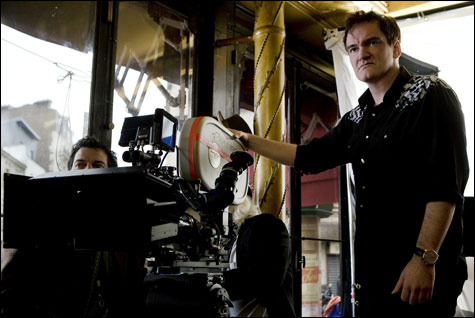
LIKE QUENTIN: Back in the '90s, Tarantino probably would have played Brad Pitt's character Aldo himself.
|
Quentin Tarantino began writing the screenplay for Inglourious Basterds more than 10 years ago. When I got him on the phone, he talked about the film's long gestation and how he chose his actors.
How does it feel to have finished this film, given that you've been working on it for over a decade?
It's a little surreal, after having the project in my mind for such a long time. I had scenes written for it, but for years it was always just kind of out there. What kept preventing me from making the movie earlier was that it was just too big and too involved, almost like a mini-series. And just before I turned it into a mini-series, I decided to take one more crack at trying to make it as a movie. That's when I came up with a new storyline about the premiere of a German propaganda film, which I completed about a year ago in just seven months. So the final draft was a weird combination of this long-gestating project and something I had never worked at with more intense momentum.
Since Brad Pitt's character, Aldo, is — like yourself — from Tennessee and part Cherokee, I was wondering whether he was modeled on you?
He's definitely modeled after me. I probably would've wanted to play the character if I had finished writing the script way back when, in the '90s. But now, I don't want to act at all.
Why did you decide to have this all-Jewish unit led by a gentile from the south?
Basically, Aldo's this character I've had in my mind for a very, very long time. So in a way he came before the Basterds. Furthermore, it's kind of a two-way proposition, because Aldo had been fighting racism in the South before the war. And if he survives the war, he's going to continue fighting the Klan in the '50s, with his own version of the Basterds in the Tennessee hills. Also, the fact that he's part Native American is significant, because what he's doing against the Nazis is similar to the Apache resistance: the ambushing of soldiers, desecrating their bodies, and leaving them there for other Germans to find. Aldo's idea is to find Jewish soldiers because he should be able to motivate them more easily — they are essentially warriors in a holy war against an enemy that's trying to wipe their race off the face of the Earth.
Why — other than Brad Pitt — did you choose relatively unknown actors?
Since I was casting country-appropriate, every actor had to be from the place they were representing, and they had to be able to speak the appropriate language as well. In other words, it wasn't enough that you could speak German, you had to be German. Oddly enough, in Germany this is considered an all-star cast.
How did director Eli Roth get involved with the project as an actor?
Eli's a really good friend of mine, and I've always known that he's a really fun performer on screen. Plus, he looks like his character, the Bear Jew, and he does an impeccable Boston accent.
What's next?
I don't really know. Usually, when I finish making a movie, I have to pause to contemplate life a little, and then I see where to go. It's not like I'm shopping for scripts. I generally have to start from scratch every time. However, I could go with Kill Bill 3. Or I could do a prequel to this movie, because I have half of it written. It's actually a story about the Basterds with a bunch of black troops.
How would you say the internet has influenced film?
What the Internet has done is destroy film criticism. I would never have guessed 10 years ago that the profession of film criticism would be going the way of the dodo.